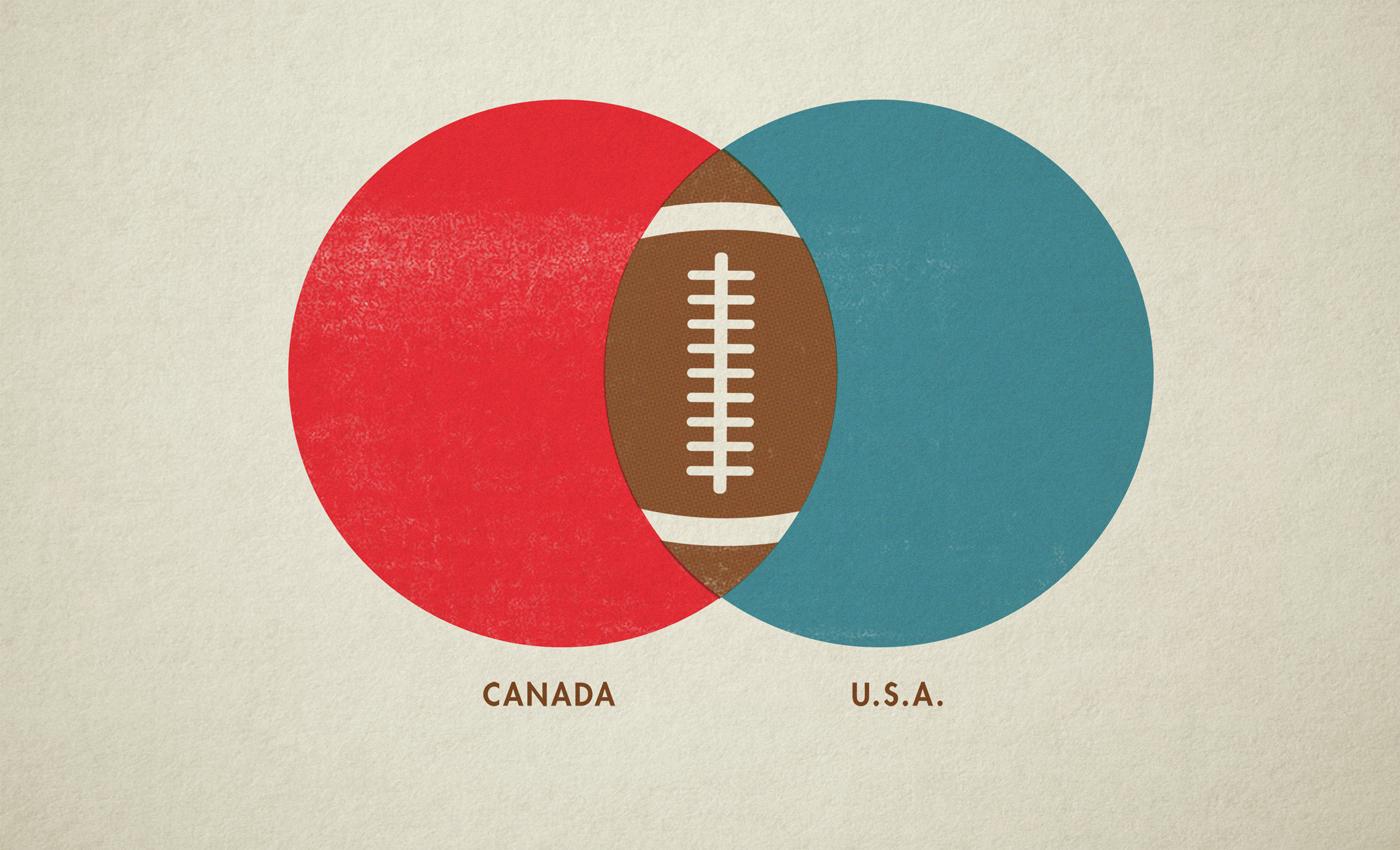
Money & the World
The Real Super Bowl LI Battle Is Between Canada and America
For the first time in history, Canadians will be able to watch the U.S. broadcast. Here's why we're putting our new ad on the Canadian broadcast anyway.
Wealthsimple makes powerful financial tools to help you grow and manage your money. Learn more
The year 2017 will be a historic one for people who want to watch a Clydesdale and a puppy fall in love for the express commercial purposes of the Anheuser-Busch corporation. Because for the first time ever, Canadians will be able to watch American Super Bowl advertisements. It’s an event that kind of blew the collective minds of the advertising class. Canadian companies started to wonder: Will their ads get the same views? Will most Canadians tune in to the American broadcast so they don’t miss an Amazon Echo shaming Dan Marino? We are particularly interested this year, since we’ve made a Super Bowl ad that we’re especially proud of.
Last year, we explained why Super Bowl advertising in Canada was, counterintuitively, one of the best deals around. This year, we’re explaining why we think it still is.
Here's How it Used to Work##
American programming often gets broadcast in Canada—especially for Canadians who happen to live near America. When those American broadcasts happen to feature the exact same content as a Canadian broadcast, like on game day, the cable company, which sells its ads in Canada, does something nifty. It replaces the American ad with a Canadian ad, so that instead of the Denny’s commercial in the American broadcast, Canadians see a Tim Hortons ad. The practice is called simultaneous substitution—or “sim-sub” in ad-nerd patois—and it started because American stations were situating themselves close to the border to target Canadian viewers and earn money advertising to them.
The practice of selling those replacement ads earns Canada’s broadcasting system about $250 million annually, and a lot of that money comes from American advertisers who have to pay Canadian cable companies to reach Canadian viewers. Without sim-sub, American advertisers would have little incentive to buy ad spots in the Canadian broadcasts.

Sign up for our weekly non-boring newsletter about money, markets, and more.
By providing your email, you are consenting to receive communications from Wealthsimple Media Inc. Visit our Privacy Policy for more info, or contact us at privacy@wealthsimple.com or 80 Spadina Ave., Toronto, ON.
This is how it used to work with the Super Bowl.
Here's How it's Working this Year##
This year there will be no substitution. The CRTC—the Canadian Radio-television and Telecommunications Commission, which governs Canadian media—has decided that Super Bowl ads are an “integral part of the event.” Basically, they decided that the ads are the event and so shouldn’t be subbed out. After all, lots of people watch the Super Bowl expressly for the ads, and Canadians felt they were missing out. This change means that while CTV will broadcast the game this year as usual, Canadian viewers who have the option of watching a local American Fox affiliate will be able to watch the American ads unhindered. Only Canadians who live near the border will be able to watch the American ads, of course. So, not a big deal, right? How many Canadians actually live close enough to the border to have a local Fox affiliate? A lot, in fact, considering that 75% of Canadians live within 100 miles of the border. In Toronto, viewers will be able to choose between the CTV broadcast and the Fox broadcast from Buffalo.
Which is why there has been a big media fight. Bell Media, a behemoth that runs most of Canada’s major channels, bought exclusive rights to broadcast the Super Bowl in Canada for an undisclosed but certainly gargantuan sum. And seeing that Fox’s American incursion will cost them money, they appealed the CRTC’s decision. Bell Media does, after all, have a binding contract with the NFL through 2019, and it was negotiated long before American advertisers invaded (with hundreds of dachshunds in hot-dog costumes leading the charge). The way advertising works is that broadcasters sell time to companies with a guarantee of viewership. So if viewership of the Canadian broadcast drops precipitously and Bell doesn’t meet its promises, they’ll have to compensate advertisers by offering additional inventory—basically, they’ll have to run free ads on other programming to make up the difference.
Canadians Want to Watch American Super Bowl Ads. But They're Also Proud to be Canadian.##
Part of the reason that the CRTC changed the rules is to please their constituents. Canadian viewers want to see American Super Bowl ads, which are considered to be, well, the Super Bowl of the advertising world. Some Canadians wanted to see the American ads so badly that they hopped onto the CRTC website and lodged an official complaint. And according to the last available tally of those complaints, 20% of those made about commercials referred in particular to the Super Bowl. Namely: Hey, you’re not letting us watch all the cool ads! And it’s true that Americans spend more money on their Super Bowl ads than we do. “It’s a matter of scale,” said Jamie Greenberg of Facet4 Media, a company specializing in Canadian media. “In Canada, you have 10% of the population, so you have a considerably smaller market to advertise for, so the scale of the ads is usually lower—really by a factor of 10.” That’s right: one-tenth the budget, one-tenth the puppies.
The CRTC listened to the complaints. Why? Greenberg thinks it’s because it was a rare opportunity to actually respond to the people: “The CRTC gets a lot of complaints where it doesn’t have jurisdiction. ‘Someone said a bad word on TV!’ They can’t really do much about that. But when a lot of the complaints concerned one thing that it could regulate, the CRTC decided that it would.” If your kid asks for a pony nine times a day, when he asks for a hamster, he’s got a shot.
Canadians are Torn Between Love of Country and Love of Apple Commercials##
The response the decision has elicited seems to be equal parts patriotism and strong interest in Charlotte McKinney. When the news broke, we collected some sample comments:
“Couldn't care less about that particular piece of overhyped American cultural gaudiness,” commented Dave Villeneuve on Huffington Post.
“Personally, I would like to ban all American media content for our own. I like Americans; I just don't want to be brainwashed to live like one,” said Bill Rice on Huffington Post.
“Let's see the American commercials and have the entire experience rather than just the 50% our overlords might, for their own greedy purposes, prefer,” commented Mike Smith on CBC.
“Canadians watch a large portion of American ads anyway. It just happens that the Super Bowl is the behemoth of ads and Bell thinks we want to watch the same silly Canadian commercials we ignore the other 364 days of the year,” said Greg Anderson on CBC.
Beyond the comments section of Huffington Post, the decision to let American ads play has brewed discontent in some unlikely sectors. In a letter to Canada’s ambassador in Washington, D.C., Florida senator Marco Rubio expressed his displeasure by arguing, a little dramatically, that trouble in the relationship between the NFL and Bell Media may ultimately undermine U.S.–Canadian relations. Rubio suggested that the CRTC is devaluing the Super Bowl, a hallowed American tradition, in the eyes of Canadian citizens and advertisers. The move, he wrote, “sends a troubling signal about the value Canada places on its largest trading partner, best customer, and close friend.” That’s right. Charlotte McKinney biting into a Carl’s Jr. burger is an act of war.
So Now it's Totally Dumb to Advertise on the Canadian Broadcast, Right?##
Well, we at Wealthsimple looked into it, and we don’t think so. The Super Bowl is a huge deal in Canada. In the past five years, the Super Bowl has beat out the Oscars, the Stanley Cup, and the Grey Cup in size of viewership. Last year we learned that a higher percentage of Canadians watch the Super Bowl than Americans, and that held true in 2016: 8.3 million viewers tuned in.
We still believe that Super Bowl ads in Canada are an enormous value, whether or not people are curious about the American broadcast, too. Super Bowl ads in Canada cost between $150,000 and $200,000 for 60 seconds. Consider that this year Fox sold 30-second Super Bowl spots for no less than $5 million. We don’t think the numbers will fall off — we think Canadian viewers will still watch the CTV broadcast because a lot of people watch CTV. But even if the numbers erode a little bit, the value is still on the side of the Canadian broadcast – last year we calculated that you get 2.4 times as many viewers in Canada as you do in America for every dollar spent.
Which isn’t to say we won’t be tuning in to Super Bowl ad highlights on YouTube the next day. We will. But it’ll mostly to be watching our own ad, which we humbly think is as good as anything broadcast from south of the border.
Wealthsimple's education team is made up of writers and financial experts dedicated to making the world of finance easy to understand and not-at-all boring to read.









